- TOPICS
- Before and After of Study Abroad
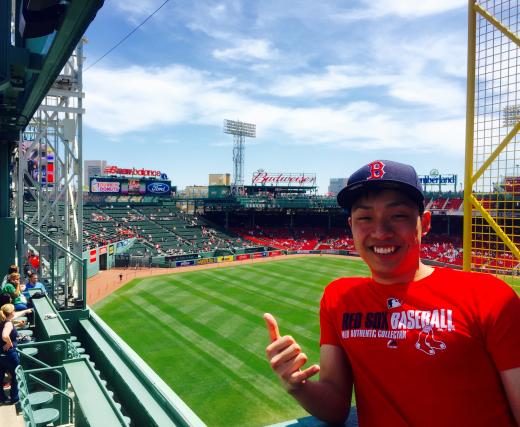
2017/12/26
Before and After of Study Abroad
Kohei Aoki entered Soka University Faculty of Economics in 2013. Upon entering Soka, he was also accepted into the Global Citizenship Program (GCP). GCP is a 2 year, intensive English honors program. In his 2nd year 2nd semester, he joined Nishiura seminar. In his 3rd year 2nd semester, he went to the University of Massachusetts, Boston as an exchange student. Currently in his 5th year, voluntarily working with 1st and 2nd-year students as a Career Support Staff (CSS). After graduating he will be working at a foreign company in Japan.
In Japan, English is being recommended in society. Kids at a young age are starting to learn English. When did you start learning English?
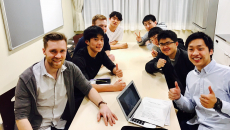
I started learning English when I was in Junior High School but it was mainly just for test taking and getting good grades. I really started to learn English when I entered the university in my 1st year. Also, I was selected to the Global Citizenship Program (GCP) honors program, which is a 2-year English program starting from freshmen year, to polish intensive academic skills in groups, studying intensive English and upon finishing the program, we focus on expertise in our respective faculties.
All languages have levels and people compare themselves with what level they know of the languages to others. What do you think your level of English was upon your entrance to the university?
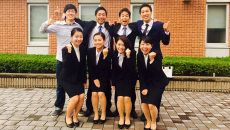
My English during my 1st year was upper level of GCP but the bottom of the group. It was hard to keep up in the class because the level of the upper class was very high. I remember studying English for hours and hours, just so I can keep up with everyone in the class. Looking back, it was very tough but I was able to gain valuable experiences during my first year.
At Soka, lots of students have opportunities to study English. For example, Faculty of Economics has the International Program. You were in the GCP program, how did GCP effect your motivation to study or learn English?
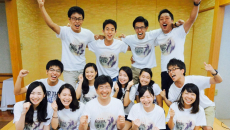
I was able to learn the significance of English. Every day we were studying and taking classes in English. Most days it was very difficult but seeing my classmates and upperclassmen work hard made me want to work even harder. In GCP, I was able to attend many international conferences that were held in English. Seeing other students presenting and interacting in English, also motivated me to improve my English. When I noticed I could use English, that is when I learned that it is a huge advantage and strength to have.
Many students are learning English, it is used world-wide. In your perspective, why do you think learning English is significant?

From high school, my dream was to work at the United Nations and learning the global standard. I always believed that by pursuing studies in English, that would make my dreams or opportunities become clearer and wider. Also, knowing or using English fluently in society today, more work-related opportunities will rise. My mother always pushed me to go out of Japan and to explore the world to meet many people and become connected with many people.
There are many people who want to go to the United States of America to study abroad, but it is quite expensive, so students tend to go to other places. You were able to go to America, when going to America what were your expectations?
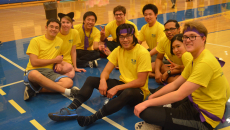
To find out what the global standards are, what I need to do to achieve those global standards, and what it means to be global. I created very high expectations because I really didn't know what it was like in the US. I feel that is very normal for Japanese students when thinking about study abroad. When they come back they tend to feel it didn't exceed their expectations, but in reality, they wanted to do more but they couldn't because they were busy studying to catch up to everyone’s level, but by the time they catch up, they have to go home.
2 years ago when you left for America, were you nervous before going to America?
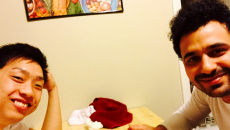
Honestly, I didn't know what to expect in America, I wasn't nervous because of my English. I already knew my English was not that good but knew at some point during my study abroad, my English would improve as long as I focused on improving. That is one thing I really want to tell students, you will improve your English as long as you are active. Don't stay in your room and study, go out and reach out to people those small things will lead to greater experiences.
Study abroad is a time where you can experience many things that you wouldn't be able to experience in your home country. Sometimes it could be good and sometimes bad. While in America, how did you grow through your English?
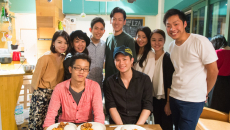
After the fall semester, I achieved straight A’s. At the beginning, I was not able to converse with friends, I was very hesitant. But after sharing many hours with friends by using English, I was able to communicate and have conversations with my friends. The difference of culture also made my friends and I very close. After understanding their culture and my culture gave me a chance to show that anyone can speak English. The other international students were very good with English, so they had strong opinions. That led to myself having strong opinions and not being swayed by others. The first 2 months I wanted to change, I needed to change and that led to actively voicing my opinions.
As a result, how was your overall experience of your English?
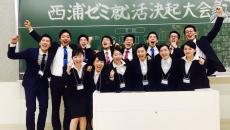
From junior high school, high school, 1st year, and 2nd year I noticed my English has gotten better over the years. I believe I gained a lot of confidence and not being hesitant of speaking English. After coming back to Japan, English has been very helpful for meeting various standards. For example, English in Japanese society is very important for job hunting.
Also, my English level now has helped me with being one of the lead RA of Takiyama International Dormitory.
Also, my English level now has helped me with being one of the lead RA of Takiyama International Dormitory.
You mentioned Takiyama International Dormitory what is Takiyama International Dormitory and what do you do?
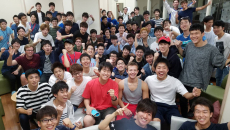
Takiyama International Dormitory opened in April of this year. It is a brand new dormitory and not much history. It is very different from other dormitories, but the other dormitories have a long history and that is something that is going to be created from now on. Duties of Resident Assistant(RA) is lower, so we can do many things. I want to leave behind diversity, and victories, so other students can do the same in their own way. I have an image of Takiyama International Dormitory in 10 years, that half will be international students and the other half Japanese students. Conversing in different languages and creating a more diverse atmosphere and hopefully, those students will become global leaders in the world.
Message for students who want to study abroad through English.
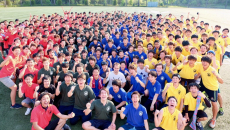
Study abroad will not make you speak English, it is not magic. Studying and being active in learning English, that experience will ultimately be the key to improving your English. Many students think that “just because by going abroad I will be able to speak English.” That is not the right mentality to going abroad. I feel that study abroad is more than just studying languages, it is about experiencing many things that you are not able to experience in your country. In your country, having many friends who study English hard and having lots of international student friends who can talk in English will help you improve your English. When in Boston, I was afraid of speaking English, having a strong will is more important than 100% English.
PROFILE:
KOHEI AOKI
Seminar:
Nishiura Seminar
Study Abroad:
During the 3rd year, to Boston, Massachusetts: University of Massachusetts, Boston
Hobbies:
Baseball, Bowling, Cooking
Favorite Book:
Protestant Ethic and the Spirit of Capitalism
Favorite Place on Campus:
4th floor of Global Square: Gran Cafe
ページ公開日:2017/12/26